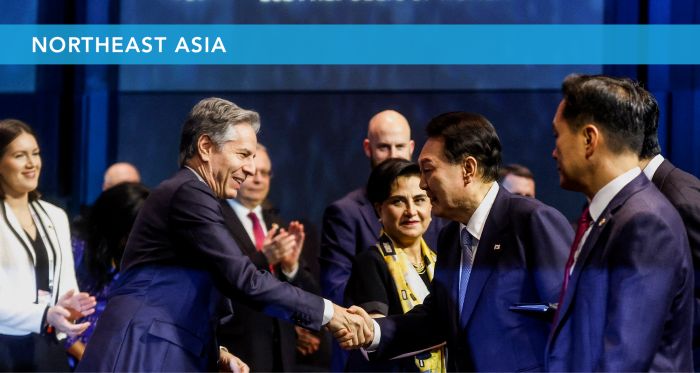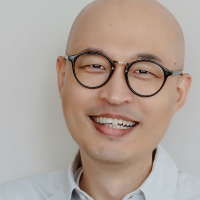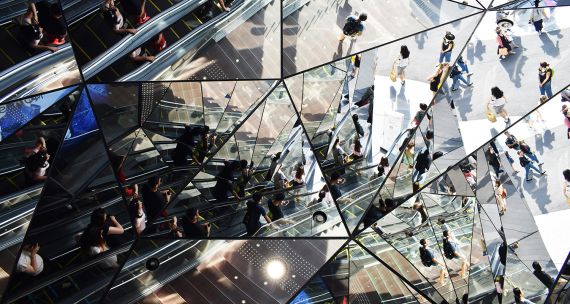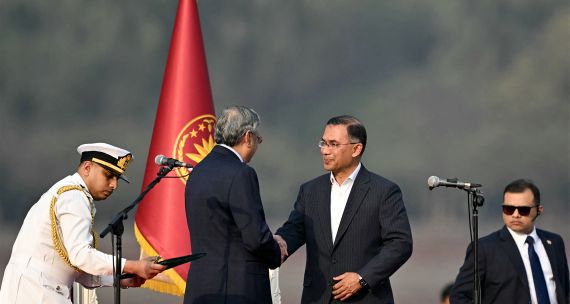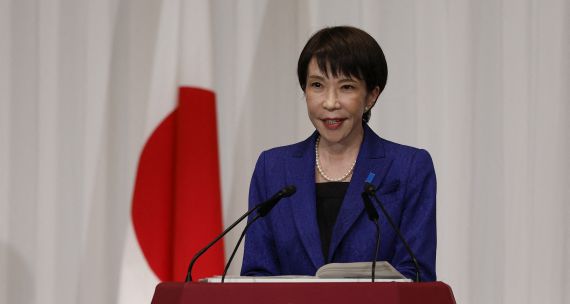The Takeaway
The third international Summit for Democracy (S4D), held in Seoul, South Korea, from March 18-20, spotlighted the role of artificial intelligence and digital technology in both bolstering and threatening democratic integrity. Additional themes included combating digital electoral interventions and enhancing international co-operation to navigate geopolitical challenges.
In Brief
- The U.S. launched the Summit in 2021 as a “flagship presidential initiative” of the Biden administration. The first gathering was held in late 2021, and the second in March 2023, both hosted by the U.S. South Korea’s hosting — in partnership with Denmark and Kenya — was significant in that it was the first Summit held outside of the U.S.
- Around 300 delegates attended this year’s gathering, hailing from governments, international organizations, civil society, and the private sector. Several heads of state and high-level officials also participated, including South Korean President Yoon Seok Yeol; U.S. Secretary of State Antony Blinken; and Canada’s ambassador to Japan and special envoy for the Indo-Pacific, Ian McKay, who attended in person.
- Canadian Prime Minister Justin Trudeau, Japanese Prime Minister Kishida Fumio, and Indian Prime Minister Narendra Modi provided virtual addresses.
- Trudeau announced more than C$30 million in funding for new projects, including C$22.3 million for initiatives designed to defend human rights and promote inclusion, C$5.6 million to strengthen resilient democratic institutions, and C$2.5 million to counter foreign interference.
Implications
South Korea’s role as host indicates the country’s ambition to become a ‘global pivotal state’ that not only supports and upholds the types of global norms from which it has benefited but helps advance related initiatives.
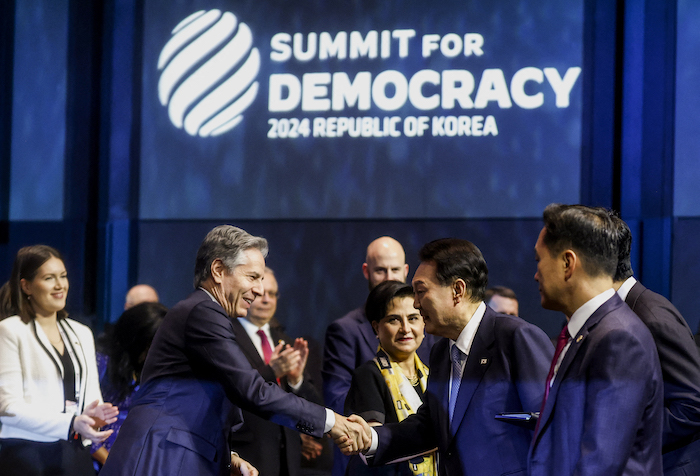
China has opposed the Summit since its inception and views it as a mechanism for building “anti-China coalitions.” This year, Taiwan’s Minister for Digital Affairs, Audrey Tang, addressed participants and pointed out that Taiwan is facing a disproportionally high number of cyberattacks. She added that AI could amplify challenges for the many elections taking place around the world in 2024 and suggested that Taiwan’s AI-related regulations could help inform the development of global standards. Tang also referred to “bad actors” who tried to influence Taiwan’s January 2024 presidential and legislative elections — a thinly veiled reference to China. As expected, Beijing responded sharply to Tang’s presence at this year’s Summit.
What’s Next:
1 The necessity of ‘following through’
While participating countries made general commitments to safeguarding democratic values and human rights, the specificity and strength of these commitments varied.
Some delegates from previous years have emphasized the ongoing need for participants to follow up on previous commitments, especially those related to anti-corruption reform and protecting the integrity of political processes. Similar efforts will be needed to track commitments from this year’s event.
2 Canada-Japan-South Korea collaboration
The Summit could catalyze a framework for international collaboration to enhance democracy, highlighting the potential for a trilateral partnership between Canada, Japan, and South Korea. One possibility could be to work together to advance the ‘Global declaration of information integrity online’ from last year’s S4D, which aims to promote responsible AI development and strengthen democratic institutions, dovetailing with Canada’s commitments to counter foreign interference.
Other key initiatives could include expanding the G7 Hiroshima AI Process Comprehensive Policy Framework — an international framework for safe, secure, and trustworthy advanced AI systems — and leveraging AI Strategy Councils in South Korea and Japan for joint initiatives to bolster and protect democratic practices.
3 Challenges and opportunities for future Summits
The Summit could bolster alliances among democracies and illuminate new pathways to collaborate on shared democratic goals. For example, the Summit could pave the way for strengthening alliances like the "D-10" (Democracy-10) group comprising major democracies like Canada, the EU, Japan, South Korea, and the U.S.
This group could be activated to collaborate more closely on issues raised at the S4D, such as promoting free and fair elections, countering disinformation campaigns, and supporting civil society organizations in the so-called ‘Global South’ and within emerging democracies.
The Summit’s resolutions could also negatively influence relations with authoritarian regimes like China and others. Future Summits will likely continue to emphasize the importance of civil society, youth engagement, and independent media in fostering democratic trust, alongside exploring models that adapt to the complexities of a multipolar world. Canada should seek to share insights from its own experiences related to these topics as well as learning from others’ experiences.
4 Leveraging South Korea’s role in global AI discussions
In May, South Korea will host the second AI Safety Summit, focused on international co-operation to manage the risks from AI. There could be a carry-over from the S4D to this and other related international discussions.
